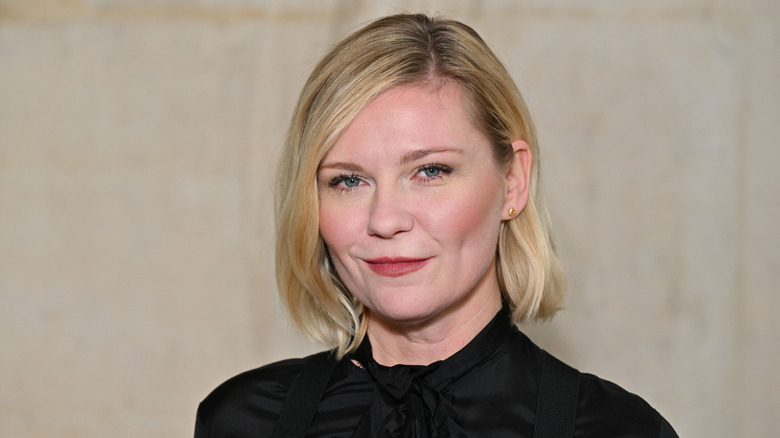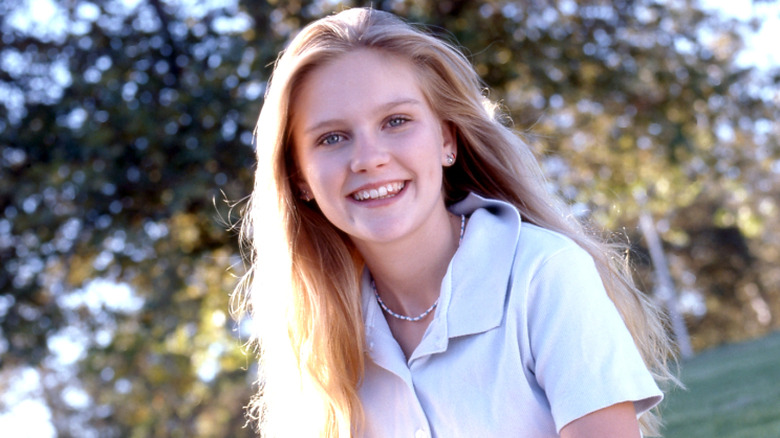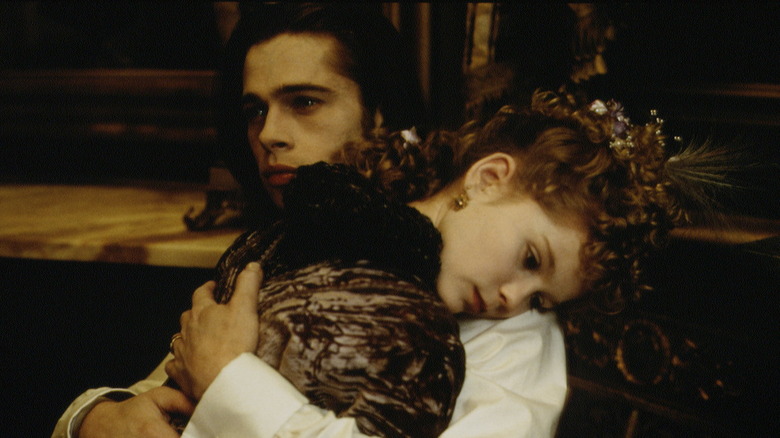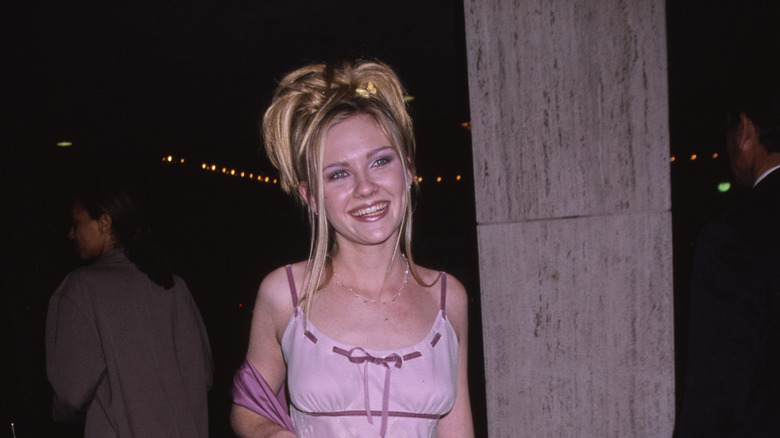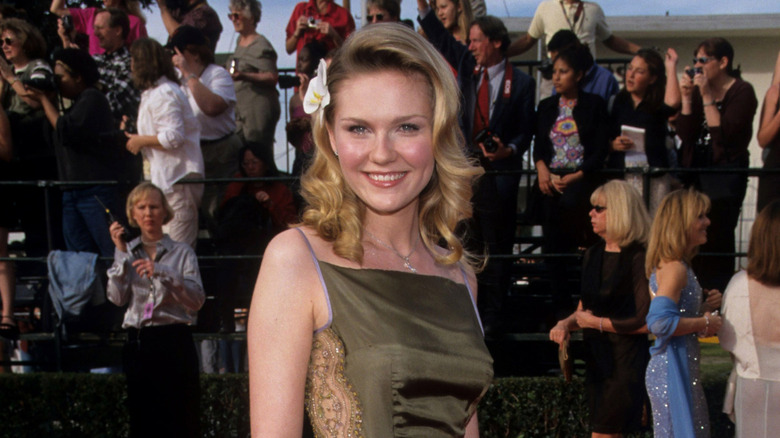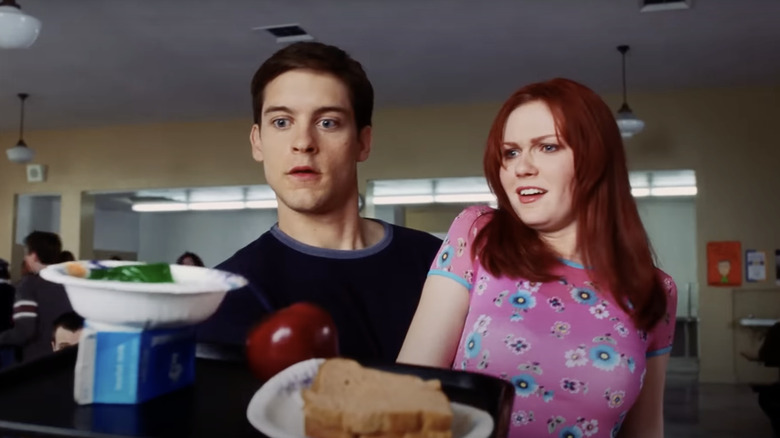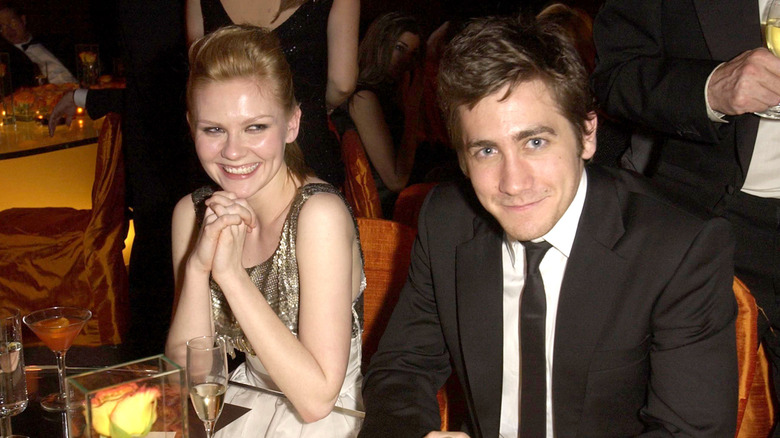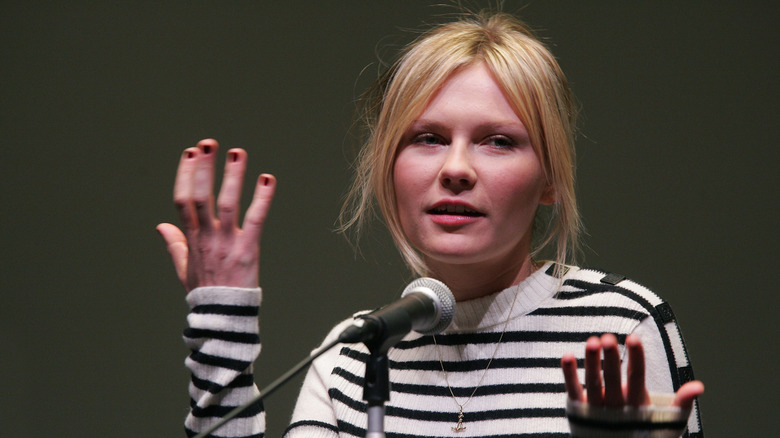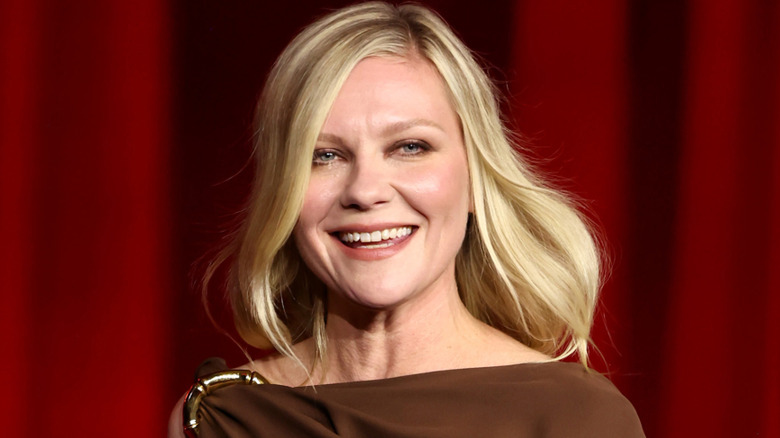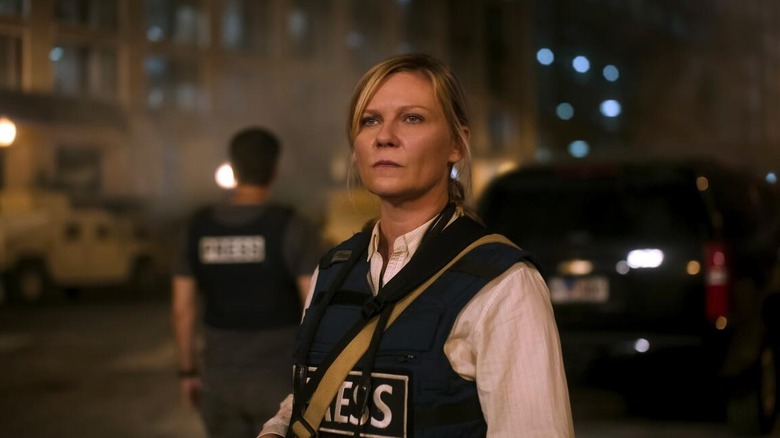Tragic Details About Kirsten Dunst
Kirsten Dunst was only 3 when she got her first taste of show business in commercials that needed a fair-haired child to go to bat for their crayons and dolls. Naturally, it was not of her own volition that Dunst set out on this path at such a young age — an arrangement that had a far-reaching impact on her mental health, she later realized. Nevertheless, she aced it at every step. Success for Dunst came early, with titles like "Interview With the Vampire," "Little Women," and "Jumanji," building up her filmography as a child star and putting her in the company of some of Hollywood's biggest A-listers.
While the headway she made may have rendered her the envy of her peers, it wasn't all rosy for Dunst, who had to navigate the thorny underbelly of show business where she was in a vulnerable position to be sexualized, manipulated, and scrutinized. In her 20s, Dunst confronted depression and creative confusion. "I was kind of over acting, to be honest, because I felt like it was for other people, not for myself," she told Marie Claire. Then, as she aged, the industry began typecasting her in roles that limited her artistry. Though Dunst resisted this, there have been points in her career where she has had to stop and reckon with her journey. Here are tragic details about Kirsten Dunst that inform her career as an award-winning actor.
Kirsten Dunst was involuntarily pushed into acting as a child
Kirsten Dunst got a start in showbiz long before she would have even developed the faculties to make complete sense of the concept. She was only 3 when she began modeling and making the rounds on the acting circuit, accompanied by her mother Inez Dunst — the primary force behind her career as a child star. "My mother told me that when I was born a wave of feeling came over her. She just knew that I was destined to be an actress," Dunst told The Telegraph. "My mum thought, 'OK, we'll try acting and put away some money for college.'" A natural talent, Dunst quickly made her way up from commercials to films, hitting it big with her first role in "Oedipus Wrecks," Woody Allen's short film from the anthology feature "New York Stories."
And though on some level she was enjoying her newfound vocation at the time, Dunst would grow up to acknowledge that getting into showbiz young had overarching effects on her psyche. "You don't know that you are repressing all this anger, it wasn't a conscious thing," she told The Times. While feelings of resentment sometimes surfaced when life in the fast lane got a little too fast for Dunst, she continued to credit her mother for ensuring a relatively normal childhood for her, away from the dark side of business — "I never missed out on anything — friends' birthdays, Halloween, prom. I didn't feel Shirley Temple'd."
She had to kiss a much older Brad Pitt in a 1994 film
Kirsten Dunst was only a preteen when she landed a role in "Interview With the Vampire," alongside Hollywood heavy hitters Tom Cruise and Brad Pitt. The 1994 goth horror film, with its star-studded cast and Dunst's superior acting chops as a child vampire, shaped up to be a vehicle for her success as a child star. But it was hardly an easy ride for the then-11-year-old Dunst, who at her premature age had to share a kiss with Pitt in the film. Pitt, by this time, had already begun accruing a fan base and making audiences swoon, which left people around Dunst excited. "Everyone at the time was like, 'You're so lucky you kissed Brad Pitt,' but I thought it was disgusting," she told Bullett magazine in 2013 (via ET Online).
While the film had other moments that gave Dunst the ick — including a scene in which she had to bite a woman's sweaty neck — her kiss with Pitt stood out as the one people talked about most. Dunst herself did much of this talking, reiterating her discomfort over the years in multiple interviews — one of which also went viral on TikTok and fueled some burning questions about Hollywood's treatment of its child actors. "I was a little girl, and he was like a brother to me, and it was very weird, even though it was a peck," Dunst told Vanity Fair in 2021.
She was exposed to Hollywood sexism during her teens
Kirsten Dunst, like so many of her colleagues in showbiz, got a taste of the sexism that plagues Hollywood not too long after she set foot in the industry. She was only 16 — and on the brink of achieving new heights of fame with Sofia Coppola's critically acclaimed "The Virgin Suicides" — when she was confronted with an uncomfortable situation during an audition. "A male director had me in his office, by myself, and was asking me about this movie he wanted me for, and then, completely out of the blue, asked me this inappropriate question," she told The Telegraph, without divulging too many details about the incident. "It's not something I like to reflect on."
Confused about how to handle the situation, Dunst told her mother about it and eventually withdrew from the running for the role. Inez Dunst kept her daughter grounded and shielded from trouble through her time as a young actor. In an interview with Deadline, Dunst reflected on how her normal upbringing — along with a dash of her own feistiness — protected her from and helped her rebel against the industry's sexist standards of compliance. "I remember once my manager saying, 'Harvey doesn't think you like him,' and I was like, 'So what? I'm not kissing his ass!'" she recalled in reference to disgraced producer Harvey Weinstein, whose sexual exploits were common knowledge in Hollywood long before #MeToo, according to Dunst.
Kirsten Dunst was paid far less than her male co-stars
Though Kirsten Dunst managed to navigate Hollywood's double standards as an intelligent, clued-in young star, she didn't know what to make of one of its longstanding gender disparities — namely the pay gap between male and female stars. This discrepancy reared its head, incidentally, during the 2002 film that gave Dunst one of her most memorable roles to date: Mary Jane Watson in "Spider-Man." Long before she was cast in Sam Raimi's superhero film, Dunst had been riding her wave of success as a promising actor, with titles like "The Virgin Suicides" and "Bring It On" under her belt. But that distinction hardly gave her immunity against Hollywood's tendency to pay female actors less.
"The pay disparity between me and Spider-Man was very extreme," she told The Independent. "I didn't even think about it. I was just like, 'Oh yeah, Tobey [Maguire] is playing Spider-Man.'" While Hollywood has no dearth of female celebrities who have negotiated for better pay these days, Dunst was only a teenager when she worked on "Spider-Man." So despite her awareness of being paid less than the male lead, she didn't know better than to just go with it. "So it wasn't as if I was turning up to the set every day feeling bad about it. It was just something no one even thought to question," she told The Telegraph.
During 'Spider-Man,' she was urged her to change her physical appearance many times
Superhero fandoms and cinemagoers at large found a new crush in Kirsten Dunst after the release of "Spider-Man" in 2002. But unbeknown to her legions of fans, Dunst had to dissent rather actively to go against the grain of the industry's stereotypical beauty standards. Talking to GQ, she recalled an incident in which she was driven to the dentist in order to get her teeth aligned during the making of the Marvel film. She put her foot down and stayed in the car. "I had Sofia [Coppola] at 16, who thought I was so cool and pretty when I didn't. She was like, 'I love your teeth!'" she said, referring to collaborator and friend Sofia Coppola.
Dunst also had to resist the sartorial expectations that came with her status as the female lead of the film. In Dunst's words, "[T]hey wanted me to look like a sexy young woman who would appeal to a broader range of whoever gets seats in the theatre." Dunst, meanwhile, was all but content to indulge her freestyle fashion sensibilities and threw caution to the wind as far as Hollywood's red carpet standards were concerned. These early choices also set the tone for the wisdom she later gained in life, strictly laying off on any cosmetic procedures to change her appearance. "I'd rather get old and do good roles."
Her relationship with Jake Gyllenhaal was subjected to endless scrutiny
For those who remember, there was once a time when Kirsten Dunst and Jake Gyllenhaal were nothing short of royalty in the Y2K pop culture canon. The star pair began going out in 2002 — when they were still in their early 20s and tabloid journalism was witnessing a frenzied online surge. The press pored over every detail of Dunst and Gyllenhaal's relationship — from the domestic life they shared with their dog Atticus to their iconic salad lunch in London, which still continues to spawn memes.
The rumor mills were in overdrive when it came to the more intimate details of the A-lister duo's romance, with media reports quoting sources who claimed to have heard Dunst and Gyllenhaal getting it on in public. One aspect of press coverage surrounding their relationship that appeared to bother Dunst the most was the question of marriage. "Seriously, I'm 22 years old. It's so annoying that they put pressure on you," she told People then.
Beloved as the celebrity relationship was, it failed to last, and the two parted ways in 2004. While reasons for their breakup were not entirely clear, with Gyllenhaal's camp assuring fans that the split hadn't affected their friendship, reports cited the difference in their lifestyles as a contributing factor. "Kirsten and I know what's real and what isn't," Gyllenhaal said at the time.
Kirsten Dunst sought treatment for depression in her 20s
After long years of work and success, things came crashing down on Kirsten Dunst in her 20s. The pressures that had been tailing her since she was a child performer appeared to have caught up with her, manifesting as depression. "For a long time, I never got angry with anybody. I just swallowed a lot down," she told The New York Times. Eventually, it all boiled over. As Dunst put it, "At a certain point, you've got to get angry, and I think that eventually builds up in someone. You can't survive like that." Amid widespread rumors surrounding her use of drugs — which she later came forward to dispel — Dunst checked herself into rehab in Utah for her mental health in 2008.
Following her rehab stint, Dunst opened up about the benefits of seeking professional help in a bid to break the stigma attached to it. "It's hard to talk about such a personal thing, but it is important to share too," she told The Times. "All I'll say is that medication is a great thing and can really help you come out of something." Dunst's recovery from depression hardly discouraged her from exploring the disorder once again for the screen in Lars von Trier's "Melancholia" — widely acclaimed as one of the best films of the 21st century. In fact, her own brush with the experience informed her award-winning role as the severely depressed Justine.
The industry began typecasting her in sad mom roles after a certain age
All through her lifelong career, Kirsten Dunst gave Hollywood a glorious view of her acting range. Yet somehow, the industry stopped tapping into it as well as it should have. Her big-screen star power appeared to have dwindled over the past decade, only returning with her Oscar-nominated performance in Jane Campion's 2021 drama "The Power of the Dog." But aside from bringing her the Academy acclaim she long deserved, her tragic role as Rose Gordon put her at risk of being pigeonholed in the "sad mom" category, she told Marie Claire.
Sidestepping offers for such roles translated to a two-year lull in Dunst's vibrant filmography. But it wasn't a crossroads she hadn't arrived at before. As she recalled to GQ, she had navigated a similar predicament after her smashing performance in "Melancholia," shaking up the film genres she worked in to avoid being typecast in any single one. "I'd rather do something weird and off-kilter, and work with a first-time director, than do anything middle of the road, because I would just be depressed doing that," she said. Notwithstanding her signature rebellion of not giving into the industry's whims, Dunst admitted that laying off work was not easy, especially given her dual status as a dedicated actor and mother to two sons.
Her work on 'Civil War' left a scarring impact on her
Certain quarters of mainstream Hollywood may have written Kirsten Dunst off, but the Oscar-nominated star proved that she's still very much got it with the 2024 film "Civil War." And while Dunst's role as a war photojournalist in A24's dystopian thriller was well received by critics, the effect it had on her own mental state wasn't all pleasant. "I remember coming home and eating lunch and I felt really empty," she told Marie Claire, revealing that the violent overtones of the film left her with post-traumatic stress disorder for a couple of weeks. As director Alex Garland put it, Dunst "let herself live inside the film."
Though Dunst is no stranger to exploring the more miserable aspects of the human experience for the screen — as she did in "The Power of the Dog" — she has admitted to the unease that accompanies this part of her job. For her role in the 2021 Western, Dunst had to tap into the vulnerability of her youth, which "isn't a place I really want to live in, but for the role, you have to," she told The New York Times. Luckily for her, having her husband Jesse Plemons star in the film beside her helped relieve some of the baggage she took home from set. "We had each other through this whole thing," she said.
